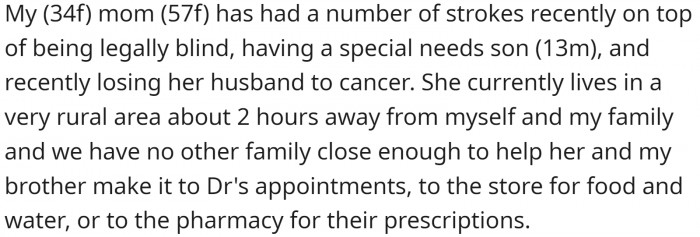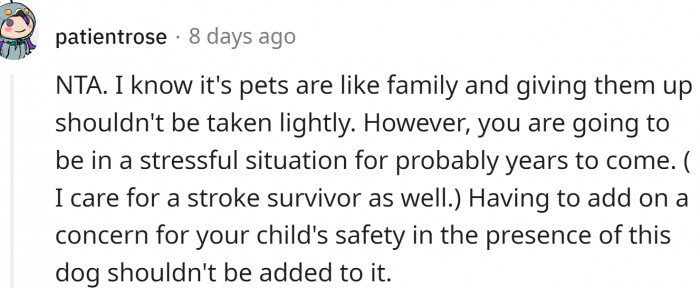Redditor Has To Tell Her Elderly Mom That After Suffering A Stroke And Losing Her Husband, She Will Lose Her Dog Too
As we get older, our health deteriorates, and sometimes we are forced to ask for help from the people we’ve been supporting and who have been our role models. And it is hard.
Parents spend their whole lives taking care of their kids, being there for them, and being strong and reliable… But years take their toll, and sometimes people need to switch roles.
Some elderly individuals take this transition very hard. It is easy to understand them – they were once role models and the rocks for their children, and now they have to ask for help.
We have one of those stories today. OP has a mother who desperately needs her help, and she is doing the best she can.
“My (34f) mom (57f) has had a number of strokes recently, on top of being legally blind, having a special needs son (13m), and recently losing her husband to cancer. She currently lives in a very rural area about 2 hours away from my family and me, and we have no other family close enough to help her and my brother make it to doctors' appointments, to the store for food and water, or to the pharmacy for their prescriptions.”
This situation was not sustainable, and OP needed to come up with a solution. It didn’t need to be a great one, just good enough.
“That being said, I finally convinced my husband (35m) that it's not possible to keep helping from a distance, and we have rented a larger space to accommodate the two of them. We've rented a 3-bedroom house where my mom will have her own room, and where my brother can share a room with my 2 sons (4m and 2m).”
OP asks:

Her mom is in a bad situation and needs her help

OP convinced her husband to make some changes to accommodate her mother and brother

The Emotional Toll of Loss
This scenario highlights the profound emotional impact that loss can have, especially when it involves multiple significant relationships.
Research in bereavement psychology emphasizes that losing a loved one, such as a spouse, can lead to complicated grief, which complicates the mourning process.
When compounded with the loss of a pet, individuals may experience intense feelings of loneliness and despair.
Navigating Grief and Loss in Family Dynamics
Experiencing multiple losses, such as a stroke and the loss of a spouse, can significantly impact one's emotional state and decision-making capabilities. Research in grief psychology emphasizes that individuals often experience a range of emotions, including sadness, anger, and confusion, which can complicate their ability to cope with additional losses.
In this context, the decision to potentially lose a pet adds another layer of emotional distress, as pets often serve as sources of comfort and companionship during challenging times.
But there is a problem - the dog

Her mom doesn't want to give it away. She feels she has lost so much and doesn't want to lose her furry friend too

OP is willing to make sacrifices. But she needs others to make them too

In times of loss, it's common for individuals to navigate a range of emotions, from anger to profound sadness.
Studies show that acknowledging these feelings is crucial for processing grief and moving toward healing.
However, the added stress of having to make difficult decisions, such as rehoming a pet, can heighten these emotional responses.
According to Dr. Elisabeth Kübler-Ross, understanding the stages of grief can provide a roadmap for those navigating such transitions. The emotional responses experienced can vary widely and may not follow a linear path. Recognizing these stages can help individuals understand their feelings better and seek appropriate support.
In this case, the daughter may need to provide additional emotional support to her mother, acknowledging the depth of her grief while also helping her navigate the practical aspects of pet care.
OP also addressed some concerns:

Her mom couldn't get any outside help because she lives in a rural area

So many sacrifices

What Research Says About Coping with Grief
Effective coping strategies are essential for navigating the grieving process.
According to Dr. Susan David, a renowned psychologist and author, "Grief is a natural response to loss, and engaging in meaningful rituals can help us honor our loved ones while fostering emotional resilience." Additionally, Dr. Rick Hanson, a neuropsychologist, emphasizes that "seeking social support during times of loss can provide comfort and promote healing, even in the face of overwhelming grief."
The Importance of Communication in Times of Crisis
Effective communication is crucial when addressing sensitive topics such as loss and grief. Research suggests that open dialogue can foster emotional healing, allowing individuals to express their feelings and fears. By creating a safe space for conversations, family members can support each other through their grief.
Encouraging the mother to share her feelings about the potential loss of her dog can help validate her emotions and provide an opportunity for her daughter to express her concerns as well.
This decision wasn't taken lightly

This is a painful situation. The dog is small but could still severely injure a toddler.

"13-yo and two toddlers is an inappropriate sharing arrangement"

For individuals facing similar challenges, it may be beneficial to create a support network of friends and family who can provide emotional assistance.
Research shows that individuals who actively seek social support during times of grief tend to experience better emotional outcomes.
Additionally, participating in grief counseling or support groups can provide a safe space for processing feelings and finding closure.
Behavioral strategies, such as engaging in family rituals to honor both the deceased spouse and the pet, can facilitate emotional processing. Creating shared experiences, whether through memory-sharing or memorial activities, can strengthen family bonds and provide a sense of closure.
Furthermore, seeking external support from grief counselors or support groups can help family members navigate their feelings and develop coping strategies, enhancing their emotional resilience during this challenging time.
This is going to be a stressful situation for probably years to come.

Mom lost her husband, now her home....

There goes her dignity...

Understanding the Complexity of Grief
Grief is a complex and multifaceted process that can manifest in various ways.
Studies indicate that there is no 'right' way to grieve, and each individual's experience is unique.
Recognizing this complexity is essential for providing oneself with compassion and patience during the grieving process.
"People form attachments to pets and this may push her over the edge"

This Redditor agrees:

OP has children to protect

Practicing self-care is critical during periods of loss and transition.
Research suggests that engaging in activities that promote well-being, such as exercise and mindfulness, can enhance emotional health during challenging times.
Incorporating these practices into daily routines can help individuals navigate grief more effectively.
So many bad things...

Is there perhaps a way to compromise?

Regardless of her decision, she will not be TA...

This situation is difficult for everyone. OP's mom lost her husband, now her home, is unable to provide for her youngest child, has to live off the generosity of her oldest child, and must follow her rules to live in her home, so there goes her dignity.
OP sees a nasty, grumpy, unlovable dog. Her mom sees another thing she's going to have snatched from her by forces beyond her control.
Psychological Analysis
This situation highlights the profound impact of grief on family dynamics. The accumulation of losses can create emotional turmoil, making it difficult for family members to navigate their feelings. Encouraging open discussions and providing emotional support can help family members cope with their grief more effectively.
Analysis generated by AI
Analysis & Alternative Approaches
Insights from grief psychology illustrate the complexities of navigating multiple losses within family dynamics. Research consistently emphasizes that open communication and emotional support are crucial for healing during such difficult times.
By fostering a supportive environment and seeking external resources, families can navigate their grief more effectively and strengthen their connections amidst loss.
Analysis & Alternative Approaches
Ultimately, navigating grief requires understanding and compassion for oneself during difficult transitions.
Research underscores the importance of social support and effective coping strategies in promoting healing.
By prioritizing self-care and seeking help, individuals can find a path toward emotional resilience amidst their losses.



